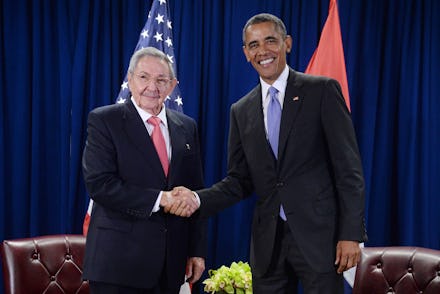Here Are the Surprising Lessons Cuba's Economy Can Teach the U.S.

HAVANA — Last Sunday morning, during a stroll through the streets of Havana ahead of President Barack Obama's historic visit to Cuba, I tweeted the following photo of a bread line stretching around the corner outside of a local bakery:
The image is a striking example of how Cuba's socialist economy continues to operate today. The country adopted a subsidized food system in 1962, which, despite modest free market reforms enacted in recent years by President Raúl Castro's government, remains intact today. Every Cuban family has a libreta — or ration book — which they use at their local store to receive basic staples, including bread, rice, and meat. The egalitarian system has helped Cuba develop high life expectancy and low infant mortality rates. But it has also created food shortages and resulted in a host of severe challenges for the Cuban people.
Predictably, my tweet touched a nerve with conservatives and libertarians, who evidently viewed it as proof that Cuba's socialist economy has failed outright:
That sentiment was not just contained to Twitter. The subtext of Obama's Cuba trip was that America's capitalist system has triumphed over socialism, and that a free market economy will help pave the road to a better Cuban future.
At a town hall event about entrepreneurship on Monday, Obama told the audience, "There are some economic models that just don't work." He proceeded to highlight a range of successful American companies, from Marriott International to Airbnb, that are planning to expand their businesses in Cuba as models that can help expand Cuba's private market economy.
Obama is not wrong. With an average monthly income of just $17, average Cubans face dire economic circumstances every day, and change is desperately needed if the country's economy is to modernize. But what if it's not so simple? What if there are lessons that Cuba's socialist economy can also teach the United States?
One of the most remarkable exchanges during Obama's visit came during his joint press conference with Raúl Castro, when the Cuban president was pressed by American journalists about human rights abuses. On the defensive, Castro responded that he considers universal health care and free college education to be human rights, too — two things which Cubans enjoy while Americans do not.
It's easy to write off Cuba's economy as a blanket failure. But the director-general of the World Health Organization recently heralded the country's state-controlled universal and free health care system as a model for the world.
"We consider health care as a human right. It's free, no matter who you are, and no matter what your ideology," Alberto Roque Guerra, a Cuban doctor and internal medicine specialist said in an interview outside Havana Hospital. The country has also prioritized biotechnology and medical research, quietly developing a number of ground-breaking drugs, including a lung cancer vaccine, despite the U.S. trade embargo.
Meanwhile, the World Bank recently declared Cuba's free and universal education system as the best in Latin America with the highest quality teachers. The system has experienced challenges in recent years, with enrollment in state-controlled schools falling; still, Cuba has long been heralded as having among the highest academic standards in the world despite the country's faltering economy. As just one proof point, the country has sent an estimated 20,000 doctors to work abroad in recent years, while thousands of medical students from around the world also flock to study in Cuba each year.
None of this serves to excuse Cuba from its dismal track record on other human rights issues, including limiting freedom of speech and freedom of the press. Indeed, just hours before Obama's arrival, the country rounded up a group of 100 dissidents from the Ladies in White protest group, made up of the wives of former political prisoners. On Tuesday, Obama met with a group of Cuban dissidents, and he also made human rights the central focus of his landmark speech to the Cuban people.
What young Cubans are saying: In my conversations with young Cubans, many shared how they are struggling financially, and how much they hope the country will undergo changes to open up the private market economy in the near future.
But a close examination of Cuba's health care and education system should serve to challenge the one-sided narrative that Cuba's socialist economy is wholly a failure, or that America's capitalist system is wholly superior. In a memorable conversation I had during my Havana walking tour, one young Cuban told me that, although his country has human rights issues, he believes America is in no position to lecture Cuba, given the way America's police treat their own citizens.
To his credit, Obama was clear to emphasize in his speech that the U.S. is not immune from criticism, stating "I actually welcome President Castro commenting on some of the areas where he feels we're falling short because I think we should not be immune or afraid of criticism or discussion as well." He also said throughout his visit that the U.S. will not dictate how Cuba should run its economy.
We would be well-served to heed those words. Optimism is running high, and all eyes are on whether Cuba will enact much-needed reform in the aftermath of Obama's visit. But Cuba should also serve as a mirror for the U.S., a lens that forces us to recognize the structural areas where our system, too, has fallen short.